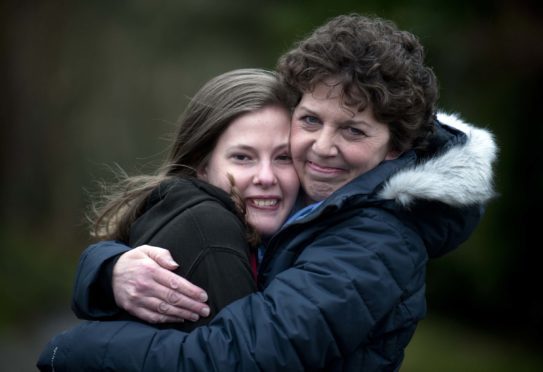Like many teenage girls, Daisy Goodyear loves to chill out with her headphones on listening to music.
But underneath the relaxed exterior, the 14-year-old faces a daily battle with a rare chromosomal condition which can cause her to sink into depression and become so anxious she will pick at her skin and even pull her nails out.
Her mother, Sarah, has to devise strategies to ensure she is not left too long on her own, for fear she would drift into her own dark world.
But the brave schoolgirl, whose parents did not know if she would ever walk or talk after being diagnosed with DiGeorge syndrome at 18 months old, has found a way to keep the depression at bay – by skiing and cycling.
Daisy, who was born with two large holes in her heart, a dangerously low immune system, joint hypermobility and low muscle tone, has even qualified for a 5K cycling race at the Special Olympic Games in Stirling this August. And she only took up the sport this year.
Proud Mrs Goodyear, from Newbyth, near Banff, said: “She’s done amazingly well.
“It was devastating when we first found out she had the deletion because there wasn’t that much information about it.
“I trawled the internet and all the sites I had been looking at painted such a black picture of learning difficulties and repeated infections and I was convinced she would succumb to an infection and we would lose her.
“We were never able to have the same expectations for Daisy, we just wanted her to be happy.”
But despite her daily battles with the condition, Daisy has always been in mainstream education and is now preparing to sit her National 4 exams, with her favourite subjects history, drama and cookery.
This is something Daisy was never expected to do and Mrs Goodyear believes taking up skiing and cycling with the Grampian Olympic group has helped her in all aspects of life.
She said: “Since she joined the group it has really helped her confidence and, while she is there, she is so relaxed and that starts to rub off in other things she does.
“Without the group, I don’t know what she’d be like, really. She wouldn’t be half as happy, if it wasn’t for them.
“She finds it tiring because of her low muscle tone and her joints get sore. But she knows she has a goal and she puts lots of effort in.
“It would be the easiest thing to let her sit with her headphones on because she is not disruptive, but we can’t, we don’t want her to sink into real depression.”
Daisy has been training with the skiing group for the last 18 months but only took up cycling at the start of the year.
She is now gearing up to join 1,200 athletes from across the UK at the Special Olympics, an event dedicated to those with intellectual disabilities.
And since taking up the sport, her episodes of depression and self harming, brought on by anxiety, have reduced.
Mrs Goodyear, who is also mum to Matthew, 19, and Millie, 12, said: “She hurt herself quite a lot. She picks at her skin and has pulled her nails out, if she’s found a class at school particularly hard or taxing. But instead now, she goes out on the bike.”
As mental health problems – including depression and schizophrenia – are common in those with DiGeorge syndrome as they age, Mrs Goodyear is now calling for greater awareness of the condition, which can often go undiagnosed.
She said: “It has such a huge spectrum and it is something that changes with age, and mental health problems are more common as they get older.
“Daisy can be on the edge of depression but, as we are aware of it, we don’t ignore it. We have lots of strategies in place.”
DiGeorge syndrome can cause as many as 180 different anomalies, from heart defects and cleft palate to severe learning disabilities and immune disorders.
Daisy was so ill as a baby that without major heart surgery at five months old she would have died before her first birthday.
Mrs Goodyear said: “For the first six weeks everything was fine. But then she started really struggling to breathe and was being sick all the time. She was really failing.
“When she was asleep in her Moses basket you could see it rocking, she was putting so much effort into breathing. It was awful to see her like that.”
She spent two years on antibiotics to help fight infection after surgeons discovered that as well as two large holes in her heart, she also had no thymus gland, which helps fight infection.
Doctors told Mrs Goodyear that the operation was a success and not to worry about anything else.
But when Daisy was still not sitting by herself at 13 months old, her mother was convinced there was more to her daughter’s condition and demanded a gene test be done.
It took five months to get the results, which confirmed Daisy had DiGeorge syndrome, also known as 22q11.2 deletion syndrome.
Mrs Goodyear is now a trustee for the Max Appeal charity which helps families of children with the syndrome to access the right services for their children’s health and education.
She said: “The first two years of development are such important years, not just for Daisy but for every child, and you have to put so much in to help the brain develop properly. If we had just left her she wouldn’t be as far on as she is now.
“She reaches all her milestones, just at a slower rate from other children. But she’s doing amazingly well. We are so proud of her.
“She’s a very loving girl and has dogged determination.”
The charity also raises money to fund vital research into the condition, which affects around one in 1,800 children.
For more information, visit www.maxappeal.org.uk
